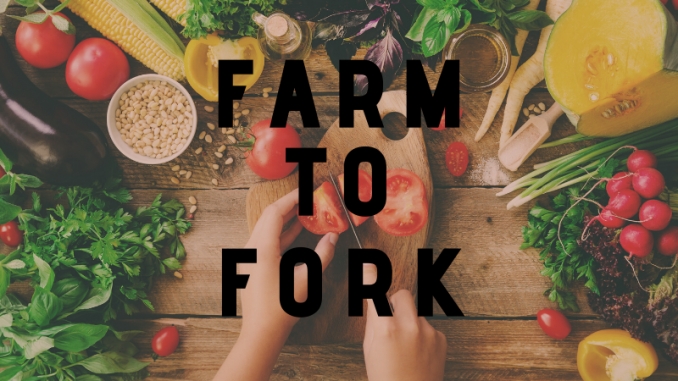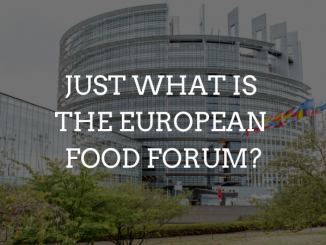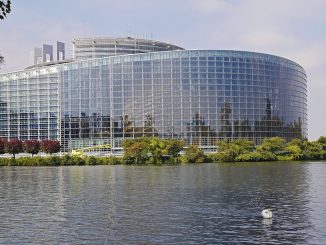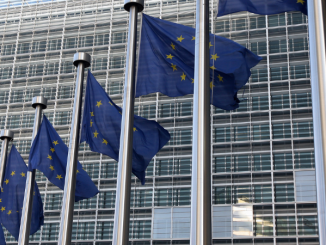Unusually for these times a cautious optimism is in the air. Last week the European Commission unveiled its much anticipated Farm to Fork strategy, and stuck to its guns with relatively ambitious new targets for agriculture. Predictably enough, the agri-lobby was not happy. Louise Kelleher walks us through the reactions.
The European Commission has caved to pressure from the eco-lobby. At least that’s the assessment of Spain’s Young Farmers Association (ASAJA) which labelled the Farm to Fork strategy “a grave and unjustified attack” on EU agriculture.
Farmers in Spain weren’t the only ones riled by the ten-year targets set by the Commission for pesticides, antimicrobials, excess nutrients and organic farming. ASAJA decried the new direction of travel as a “heavy blow for European farming”. Farming organisations around Europe were similarly upset by the Farm to Fork strategy that was announced on Wednesday.
“Outsourcing our Food Production”
COPA-COPEGA set the tone for its member organisations around Europe by raising the now-familiar spectre of food security scares. “Let’s make sure that these strategies don’t end up endangering our Food Security and rural economies – leading to outsourcing of our food production,” warned COPA President Joachim Rukwied.
COPA-COPEGA warned against “endangering strategic EU interests in food security, agricultural competitiveness and farming income.”
“A comprehensive independent inception impact assessment must be conducted before any legislative action is taken,” cautioned COPA-COPEGA. It also called for “coherent EU policies and sufficient funding”.
“Targets are Not Solutions”
COPA-COPEGA questioned the idea of setting these targets in the first place, describing it as a “blindfolded approach”. The Commission is putting the cart before the horse by announcing targets before impact assessments, it argued.
F2F is not realistic because farmers lack alternatives, says COPA-COPEGA. Farmers “need alternatives to enable them to reach the ambitious targets without destroying their livelihoods and the European rural economy.”
Farm viability is a pressing concern. The Irish Creamery Milk Suppliers’ Association (ICMSA) grappled with F2F’s definition of sustainability: “The most serious problem is the most obvious one: When this strategy mentions ‘sustainability’ does that include the sustainability of the farmers and primary food producers?” ICMSA president Pat McCormack told Agriland.
F2F could be counterproductive, warns the Irish Farmers’ Association (IFA). “These EU strategies could be counterproductive as they will drive European farmers out of business, leaving the EU dependent on these imports and threatening food security,” said IFA president Tim Cullinan, as reported by Agriland.
The Czech Farmers’ Association used similar language to express its concerns. “The targets of the strategy are counterproductive,” argued Jaroslav Šebek, president of the Czech Farmers’ Association (ASZ). “Politically motivated limitations will do no good.”
Czech farmers are afraid of losing their competitive edge. That’s their main concern with outsourcing food production to third countries. “The costs of adhering to safety restrictions are already several times higher than in third countries,” said Vladimír Pícha, spokesperson for the Agricultural Association of the Czech Republic. “The new strategy may further increase this imbalance,” he told local news server iDnes.
Going Down the “Road to Degrowth”
The French farm lobby warns the EU is going down the wrong road. The Commission has learned no lessons about food sovereignty from the Covid-19 crisis, said the French Federation of Farming Workers’ Unions (FNSEA).
The FNSEA argued: “while the environmental impact of F2F is uncertain, what is certain is that it will lead to an increase in food imports for Europeans”.
Apart from objecting to the idea of outsourcing our food production, the FNSEA noted that imported food is often treated with plant protection products that are banned in the EU.
Warning against going down “the road to degrowth”, the FNSEA called on the Commission to “return to the route of sustainable growth”: this would mean a Green Deal that delivers in economic, social and environmental terms. The FNSEA wants to see a “proper” green transition that favours innovative investment – especially in the digital domain – and is supported by the new CAP.
Big Food as “Part of the Solution”
Industry groups meanwhile scrambled to express support for the new strategy, and were careful to keep their criticisms more nuanced.
Poultry industry lobby group AVEC insists that European poultry meat is “part of the solution”, and fears that the new demands on producers will jeopardize EU food security.
Like the farmers’ organizations, AVEC claimed the livestock sector is unfairly blamed for climate change. “Livestock production represents less than 6 % of the total EU emissions – other sectors outside agriculture contribute a lot more.”
“Meat” the facts
The coming legislative procedure must be informed by “objective facts and science,” insists AVEC. Like COPA-COPEGA it called for “thorough” impact assessments to ensure that targets for organic farming, pesticides and fertilisers won’t impinge on food security.
They weren’t the only lobby group disputing the facts. European Livestock Voice made use of its slick social media presence to encourage the public to #meatthefacts. On Wednesday, the day of the Farm to Fork launch, European Livestock Voice asked: “But how much do we really know about livestock and the environment?”
The lobby group insisted that European livestock farmers are already taking action to deliver on animal welfare, public health demands and environmental concerns.
As Twitter users breathlessly live-tweeted the Commission’s unprecedented targets for sustainability, European Livestock Voice almost seemed to be wondering what all the fuss was about. “The European livestock sector is constantly making improvements to ensure sustainable farming practices,” the lobby group reassured us.
Animal medicine manufacturers meanwhile only want the best for animals, according to Animal Health Europe. Antibiotic sales are down anyway, argues the lobby group. It is keen to further improve the responsible use of antibiotics. However, “reduction targets should never jeopardize animal health”
The European Crop Protection Association (ECPA) took a similar tack on pesticides targets. Also invoking food security, it said that farmers need “access to solution options”.
“Targets alone are not the solution,” argued ECPA Director General Géraldine Kutas in an op-ed for Euractiv that echoed this COPA-COPEGA talking point. Instead she called for dialogue and cooperation among all stakeholders. “We all share the same goal – a more sustainable agriculture – for our planet, for our children,” stated the head of the European Crop Protection Association.
Beware “Gastro-nationalism”
Lobby group FoodDrinkEurope was careful to state its support for the Farm to Fork strategy. But it warned against “gastro-nationalism” – in other words, it says Member States must not undermine the Single Market through protectionism.
Cereals lobby group Coceral had a similar warning: “There is a a fine line between shorter supply chains and protectionism. We must not fall in the trap of protectionism.”
Farmers left out?
The Farm to Fork strategy was launched to much fanfare on Wednesday by European Commission vice-president Frans Timmermans, Health and Food Safety Commissioner Stella Kyriakides, and Environment Commissioner Virginijus Sinkevičius. Eyebrows were raised however by the curious absence on the podium of Agriculture Commissioner Janusz Wojciechowski. The agri-lobby was quick to tweet the alarm. European farmers have been sidelined, fumed José María Castilla Baró, a lobbyist for ASAJA.
Far from leaving ag out in the cold, Wojciechowski’s department were quick to reassure Twitter users that they were “central in shaping the proposals” and that the “CAP will support farmers in the transition”.
The Agriculture Commissioner’s absence didn’t go unnoticed by Pekka Pesonen, Secretary General of COPA-COPEGA. “Where is Commissioner Wojciechowski in this press conference?” tweeted Pesonen. “He is supposed to put large chunks of the package into practice in the CAP?”
Wojciechowski didn’t respond directly. He did however retweet the response of a colleague in DG SANTE, Brian Kilgallen, who stressed the central role of farmers in the Farm to Fork strategy: “ALL Commission services are involved and ALL will be involved in roll-out.”
Commission Vice-President Timmermans was accused of ignoring young farmers. “Our #FarmtoFork strategy is not against farmers, on the contrary, we need to work with farmers who are the stewards of our environment,” responded Timmermans in a tweet.
More on Farm 2 Fork
Farm 2 Fork and Biodiversity Strategies Hold Firm on Real Targets








1 Trackback / Pingback
Comments are closed.